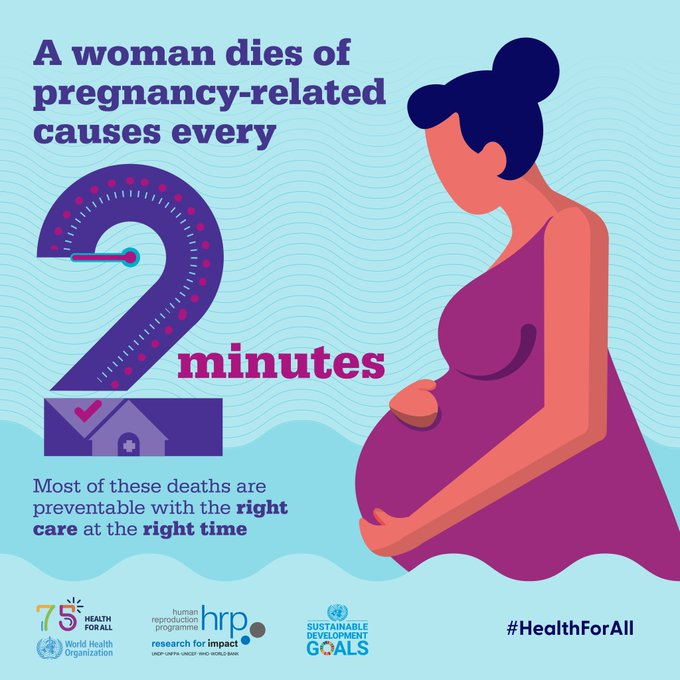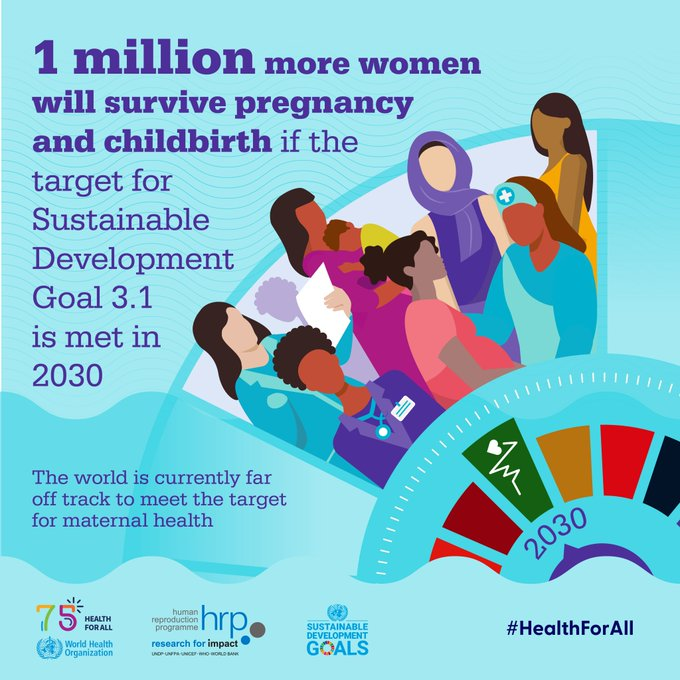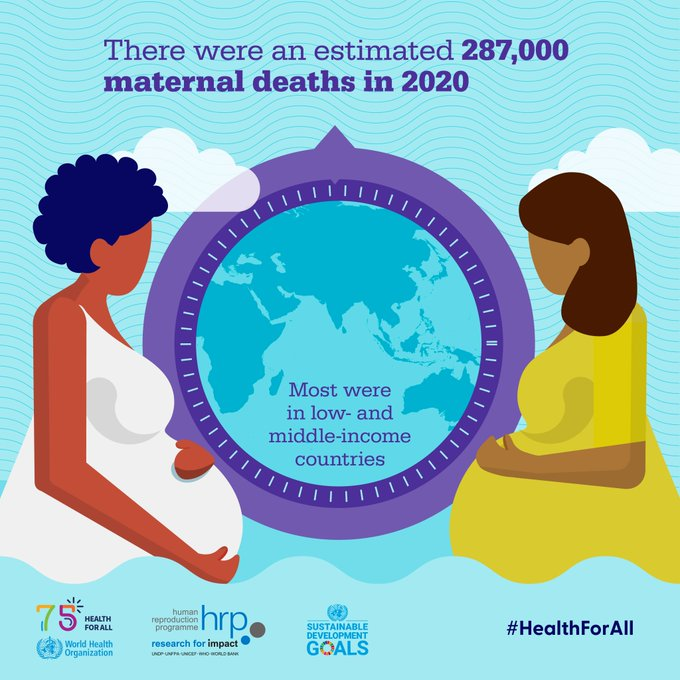New Delhi: A new report from the World Health Organization (WHO) – Trends in maternal mortality reveals alarming setbacks for women’s health over recent years across the world, as maternal deaths everywhere have either increased or stagnated in nearly all regions of the world.
Here is a look at what the report highlights:
1. According to the report, every day in 2020, approximately 800 women died from preventable causes related to pregnancy and childbirth. This translates to one woman dying every two minutes due to pregnancy and childbirth complications around the world, every day.
2. The report mentions that India recorded 24,000 maternal deaths in 2020, coming second highest in the world after Nigeria which saw 82,000 maternal deaths in the pandemic year. However, the report states that there has been an overall reduction of 73.5 per cent in maternal mortality ratio (MMR) in India — deaths per lakh live births — between 2000 and 2020.
Also Read: India’s Maternal Mortality Ratio Dips To 97 In 2018-20 From 130 In 2014-16
3. The report also states the fact that the world is far away from achieving the Sustainable Development Goal (SDG) target 3.1, which is to reduce maternal mortality to less than 70 maternal deaths per 100,000 live births by 2030. According to the data, maternal deaths have either increased or stagnated nearly everywhere in the world, from 223 maternal deaths per 100,000 live births in 2020, down from 227 in 2015 and 339 in 2000. Seeing these latest trends, WHO has warned the world that unless progress is made on global targets for reducing maternal deaths – the lives of over one million more women by 2030 could be at risk.
4. As per the report, from 2000 to 2020, there were an estimated 287,000 maternal deaths worldwide in 2020. This marks only a slight decrease from 309,000 in 2016 when the UN’s Sustainable Development Goals (SDGs) came into effect.
5. The report also indicates “some significant progress” in reducing maternal deaths between 2000 and 2015, but highlights that the gains were largely stalled, or in some cases even reversed, after this point.
6. The other key finding of the report was that maternal deaths remain largely concentrated in the poorest parts of the world and in countries affected by conflict. In 2020, about 70 per cent of all maternal deaths were in sub-Saharan Africa. And in nine countries facing severe humanitarian crises, maternal mortality rates were more than double the world average (551 maternal deaths per 100,000 live births, compared to 223 globally).
Also Read: How Healthy Are India’s Women: A Quick Lowdown
7. The report also mentions that the leading causes of maternal death are severe bleeding, high blood pressure, pregnancy-related infections, complications from unsafe abortion and underlying conditions that can be aggravated by pregnancy – such as HIV/AIDS and malaria.
Common causes of maternal deaths incl.:
???? haemorrhage
???? pre-eclampsia
???? infectious diseases
???? infection
???? unsafe abortion
These can largely be prevented & treated if there is access to quality healthcare https://t.co/7FegPsNvgZ#HealthForAll pic.twitter.com/vSqWpmxg7m— World Health Organization (WHO) (@WHO) February 23, 2023
8. The report also showS that roughly one-third of women do not receive four of the recommended eight antenatal checks or receive essential postnatal care, while some 270 million women lack access to modern family planning methods.
Also Read: Opinion: Strengthening Supply Chain Management To Countervail Iron Deficiency Anaemia
9. The report stresses that inequality related to income, education, race or ethnicity further increase risks for marginalized pregnant women.
10. Lastly, the report states that the COVID-19 pandemic HAS further held back progress on maternal health
Experts Speak
Commenting on the findings of the report, Dr Tedros Adhanom Ghebreyesus, Director-General of the World Health Organization (WHO) said,
While pregnancy should be a time of immense hope and a positive experience for all women, it is tragically still a shockingly dangerous experience for millions around the world who lack access to high quality, respectful health care. These new statistics reveal the urgent need to ensure every woman and girl has access to critical health services before, during and after childbirth, and that they can fully exercise their reproductive rights.
UNICEF Executive Director Catherine Russell adds,
For millions of families, the miracle of childbirth is marred by the tragedy of maternal deaths. No mother should have to fear for her life while bringing a baby into the world, especially when the knowledge and tools to treat common complications exist. Equity in healthcare gives every mother, no matter who they are or where they are, a fair chance at a safe delivery and a healthy future with their family.
John Wilmoth, Director of the Population Division of the Department of Economic and Social Affairs adds,
Reducing maternal mortality remains one of the most pressing global health challenges. Ending preventable maternal deaths and providing universal access to quality maternal health care requireS sustained national and international efforts and unwavering commitments, particularly for the most vulnerable populations. It is our collective responsibility to ensure that every mother, everywhere, survives childbirth, so that she and her children can thrive.
NDTV – Dettol have been working towards a clean and healthy India since 2014 via the Banega Swachh India initiative, which is helmed by Campaign Ambassador Amitabh Bachchan. The campaign aims to highlight the inter-dependency of humans and the environment, and of humans on one another with the focus on One Health, One Planet, One Future – Leaving No One Behind. It stresses on the need to take care of, and consider, everyone’s health in India – especially vulnerable communities – the LGBTQ population, indigenous people, India’s different tribes, ethnic and linguistic minorities, people with disabilities, migrants, geographically remote populations, gender and sexual minorities. In wake of the current COVID-19 pandemic, the need for WASH (Water, Sanitation and Hygiene) is reaffirmed as handwashing is one of the ways to prevent Coronavirus infection and other diseases. The campaign will continue to raise awareness on the same along with focussing on the importance of nutrition and healthcare for women and children, fight malnutrition, mental wellbeing, self care, science and health, adolescent health & gender awareness. Along with the health of people, the campaign has realised the need to also take care of the health of the eco-system. Our environment is fragile due to human activity, which is not only over-exploiting available resources, but also generating immense pollution as a result of using and extracting those resources. The imbalance has also led to immense biodiversity loss that has caused one of the biggest threats to human survival – climate change. It has now been described as a “code red for humanity.” The campaign will continue to cover issues like air pollution, waste management, plastic ban, manual scavenging and sanitation workers and menstrual hygiene. Banega Swasth India will also be taking forward the dream of Swasth Bharat, the campaign feels that only a Swachh or clean India where toilets are used and open defecation free (ODF) status achieved as part of the Swachh Bharat Abhiyan launched by Prime Minister Narendra Modi in 2014, can eradicate diseases like diahorrea and the country can become a Swasth or healthy India.

































